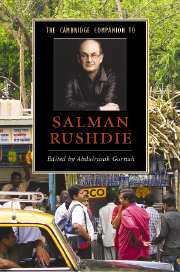5 - Family and gender in Rushdie’s writing
from Part I: - Themes and Issues
Published online by Cambridge University Press: 28 November 2007
Summary
In his comfortable, Upper West Side sublet, . . . Professor Malik Solanka nursed a glass of red Geyserville Zinfandel and mourned. The decision to leave had been wholly his; still, he grieved for his old life. Whatever Eleanor said on the phone, the break was almost certainly irreparable. Solanka had never thought of himself as a bolter or quitter, yet he had shed more skins than a snake. Country, family, and not one wife but two had been left in his wake. . . . He told them - each of his women in turn - that friendship was what he had instead of family ties, and, more than friendship, love.
Thus writes Salman Rushdie of his protagonist Professor Malik Solanka who resigns from his job at King's College, Cambridge opting out of the academy and cashing in on the lucrative world of television to make a series of 'popular history-of-philosophy' programmes. The programme is eventually a success and is aired under the title 'The Adventures of Little Brain'. It stars his collection of 'outsize egghead dolls', all made by himself, representing great thinkers. The chief 'knowledge-seeker' is the 'female time-travelling doll Little Brain' - echoing other Rushdie characters who journey through space and time, including Gibreel Farishta in The Satanic Verses, shuttling between twentieth-century Britain and seventh-century 'Jahilia', and Flapping Eagle in Grimus who falls through a hole in the Mediterranean into a different dimension. Little Brain is a 'hip, fashion-conscious, but still idealistic Candide, his Valiant-For-Truth in urban-guerrilla threads, his spiky-haired girl Basho journeying, mendicant bowl in hand, far into the Deep North of Japan'. She is the only doll he falls in love with and who breaks his heart. Appropriated by popular television she is turned into a celebrity and her intellect dumbed down for the mainstream viewing public.
- Type
- Chapter
- Information
- The Cambridge Companion to Salman Rushdie , pp. 61 - 74Publisher: Cambridge University PressPrint publication year: 2007
- 1
- Cited by

